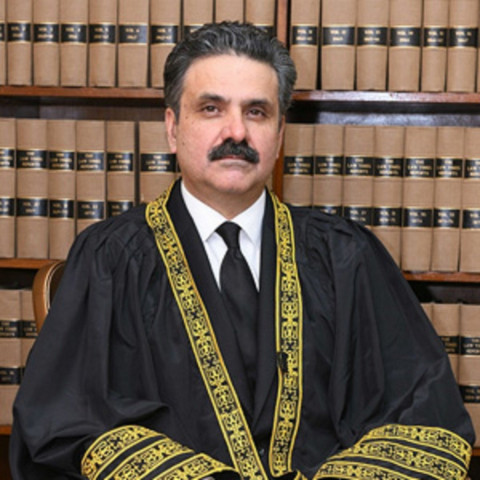Judge Yahya Afridi. Photo: SC website
In a full meeting of the Supreme Court of Pakistan chaired by Chief Justice Yahya Afridi, the court unanimously approved amendments to the Supreme Court Rules 2025 based on the recommendations of a specially constituted committee, the Supreme Court said in an official statement.
The meeting was held in Islamabad on Friday and the court formally adopted the updated rules. The Supreme Court emphasized that the changes will facilitate better service delivery and make justice more accessible and timely.
The committee, formed under Order I, Rule 1 (4) of the Supreme Court Rules, 2025, included Justice Shahid Waheed, Justice Irfan Saadat Khan, Justice Naeem Akhtar Afghan and Justice Aqeel Ahmed Abbasi. Its mandate was to address difficulties encountered during the implementation of the rules.
The court individually thanked each member of the committee for their diligent efforts, which included a detailed review of the Supreme Court Rules of 1980, preparation of the draft Supreme Court Rules of 2025 and consideration of suggestions to resolve the challenges raised by the rules.
Read: President Zardari promulgates the 27th Constitutional Amendment
According to the statement, the updates to the Supreme Court Rules 2025 are aimed at improving service delivery and ensuring affordable and speedy justice.
Furthermore, the court unanimously approved granting the status of Senior Advocate of the Supreme Court to Muhammad Munir Pracha, Advocate of the Supreme Court of Pakistan, under Order IV, Rule 5 of the Supreme Court Rules, 2025.
But ironically, despite letters written by senior Supreme Court judges, including Justice Mansoor Ali Shah and Justice Athar Minallah—who resigned a day earlier and had sought a full judicial reference on the 27th Amendment—the court refrained from any mention of the recently passed amendment, which has now become law with the president’s signature.
The 27th Constitutional Amendment
The 27th Constitutional Amendment includes the introduction of a Federal Constitutional Court, which has original jurisdiction in constitutional disputes between the government and cases involving the application of fundamental rights. Petitions or appeals pending before the Supreme Court or its constitutional chambers under this jurisdiction must be transferred to this court.
The amendment also removes the suo motu powers of the CV and deletes articles 184, 186 and 191A. The draft also authorizes the president to transfer a judge from one high court to another based on a recommendation from the Judicial Commission of Pakistan, which is the body that oversees nominations to the country’s top judiciary.
The new amendment has sparked widespread concern among the judiciary and the legal community, with critics arguing that it undermines the independence of the Supreme Court. The controversy had sparked letters from sitting judges, petitions from senior lawyers and coordinated protests from bar associations, highlighting deep apprehension about the possible shift in the balance of power between the judiciary and the executive.
Justice Mansoor had urged CJP Afridi to engage the executive regarding the proposed 27th amendment. Likewise, Justice Minallah also suggested CJP Afridi to call a judicial convention. These two judges resigned in protest on Thursday, following the passage of the 27th Amendment by parliament.




